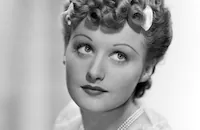Moon Over Miami

Brief Synopsis
Cast & Crew
Walter Lang
Don Ameche
Betty Grable
Robert Cummings
Carole Landis
Jack Haley
Film Details
Technical Specs

Synopsis
Sisters Kay and Barbara Latimer are working as car hops in a Texas drive-in restaurant with their aunt Susan, who is the cook, when they are notified that an expected inheritance of $55,000 is only $4,000 after taxes and fees. Determined to marry a millionaire, Kay talks Barbara and Susan into spending the money on a trip to Miami, where she hopes to hook a rich man at a resort. With Barbara posing as Kay's secretary and Susan as her maid, the three women check into the Flamingo Hotel and make the acquaintance of Jack O'Hara, a bartender who pontificates about his hatred of fortune hunters. Jack, who quickly becomes enamoured of Susan, believes that Kay is on the level and promises to steer her away from gold diggers. Kay finagles an invitation to a party being hosted by rich Jeffrey Bolton, and while there, also meets Phil McNeil, heir to the renowned McNeil Mines. Boyhood friends Jeff and Phil begin a fierce rivalry for Kay, who cannot make up her mind between the two handsome men, nor does she notice that Barbara has fallen in love with Jeff. At the end of three weeks, the women are in trouble because they need $150 to pay their hotel bill, but Susan borrows the money from Jack, who has proposed to her. Realizing that she needs to get one of the men to propose to her that evening, Kay brings Barbara along to a dance to keep one of them occupied. Kay gets Barbara to dance with Jeff while she talks with Phil, with whom she has fallen in love. Phil admits to her that he is broke, and that the McNeil Mines will not be profitable again for at least five years. Kay confesses that she, too, came to Miami to find a rich spouse, and the pair reluctantly agree to pursue other partners. Phil tells Jeff that Kay loves him, after which she accepts Jeff's proposal. As the women are packing to leave for Jeff's father's island, however, Jack overhears them talking about their scheme and threatens to tell Jeff. After locking Jack in the bathroom, the women leave for the island, where they meet William, Jeff's businessman father. Desperate to see Kay again, Phil goes to the island and volunteers to be Jeff's best man. The woman are also stunned by the arrival of Jack, who threatens to tell all if he determines that Kay does not really love Jeff. On the night of a party that Jeff is throwing for Kay, Barbara encourages Jeff to accept a challenging job in South America to escape from under his father's shadow, while Phil admits to Kay that he loves her. As Phil is trying to persuade Kay that they belong together no matter what, Jeff enters the room. Phil and Kay explain that they are going to get married, and Jeff acknowledges that he has loved Barbara all along and will marry her. Soon all ends well, as Susan and Jack also come to a romantic conclusion, and the three couples begin their lives together.

Director

Walter Lang
Cast

Don Ameche

Betty Grable

Robert Cummings

Carole Landis

Jack Haley

Charlotte Greenwood
Cobina Wright Jr.

Lynne Roberts
Robert Conway
George Lessey
Condos Brothers
Jack Cole & Co.
Robert Greig

Minor Watson

Fortunio Bonanova
George Humbert
Spencer Charters
Mel Ruick
Hermes Pan
Sergio Orta
Eric Wilton
Dorothy Dearing
Arno Frey
Leyland Hodgson
Larry Mcgrath
Florence Lessing
Ann Austin
Herbert Gunn
Edward Smith
Billy Wayne
Lester Dorr
Charles Tannen
Crew
Travis Banton
Harry Brand
Otto Brower
Harry Joe Brown
Gene Bryant
Allen M. Davey
Richard Day
Roger Heman
Brown Holmes
Wiard B. Ihnen
Natalie Kalmus
Arthur Von Kirbach
Carl Kruger
Vincent Lawrence
Thomas Little
Peverell Marley
Booth Mccracken
Alfred Newman
Morgan Padelford
Hermes Pan
Helen Parker
Ralph Rainger
Leo Robin
George Seaton
Leon Shamroy
Lynn Starling
Walter Thompson
Darryl F. Zanuck

Photo Collections
Videos
Movie Clip



Film Details
Technical Specs

Articles
Moon Over Miami - Betty Grable, Don Ameche and Carole Landis in MOON OVER MIAMI on DVD
Small surprise, then, that Zanuck quickly re-teamed her with Down Argentine Way co-star Don Ameche for Moon Over Miami, another smash hit. It was such an 'A' production that Fox lavished more money and attention on it than ever before, devoting a full year to preparation and four entire months to shoot, including six weeks in Florida under second-unit director Otto Brewer. (The rest of the movie was directed by Walter Lang.)
The story is just substantial enough to get the job done. Grable and Carole Landis play sisters who work as singing waitresses at a Texas hamburger stand. When they receive a small inheritance, they quit their jobs and head to Miami with their aunt (Charlotte Greenwood) in search of rich husbands. Or as Grable puts it: "We're going to Miami. That's right, Miami! Where rich men are as plentiful as grapefruit and millionaires hang from every palm tree!" To land the right guys, they pose as heiress (Grable), secretary (Landis) and maid (Greenwood), and check into the swankiest hotel in town. In time, they all find their husbands in the form of Don Ameche, Robert Cummings, and Jack Haley, but not before some energetic song and dance numbers and amusing plot complications.
The script was based on the play Three Blind Mice by Stephen Powys, which had been filmed in 1938 as a non-musical (under its original title), and would be again as Three Little Girls in Blue (1946), another musical. The general story device of three women looking for love, however, goes back at least to Sally, Irene, and Mary (1925) and was reworked in many other movies over the years, including Our Blushing Brides (1930), Girls About Town (1931), Ladies in Love (1936), Keep Your Powder Dry (1945) and Three Coins in the Fountain (1954), among others.
The original songs in Moon Over Miami are by Ralph Rainger and include "You Started Something," "Solitary Seminole" and "Kindergarten Conga." The latter has a fantastic tap sequence in which Grable dances with famed choreographer Hermes Pan. Apparently it was during this number that Grable collapsed from exhaustion, the result of having worked every day of production.
It would be easy to dismiss Moon Over Miami as simply a fluffy, candy-colored trifle, but such a judgment would be sorely lacking in understanding of what makes movies work. The appealing lightness and charm of the film just makes it a little harder to notice the skill and intelligence with which it blends musical performance with story and plot - not only allowing us to accept the singing and dancing characters but also linking the numbers to the plot progression. These are keys to any successful musical film and are quite challenging to pull off. Like a good dance number, they only look easy. The Fox musicals of the 1940s have always been unfairly overlooked in favor of the more polished MGM pictures of the same period, but they are equally important in the shaping of the musical film genre.
And while Moon Over Miami shapes the genre, it's also a tremendous amount of bright, sassy fun. The gorgeous sets, dreamy nightclub settings, colorful costumes, glamorous location footage, snappy dances et. al., combine to give new meaning to the word "pizzazz." Moon Over Miami even finds a way to work in a speedboat chase that could easily have inspired the one in Live and Let Die (1973), with boats jumping over spits of land in a network of bayous.
Fox Home Entertainment's DVD is available by itself or as part of the four-disc "The Betty Grable Collection Vol. 1." Moon Over Miami is the only one of the four titles not to have a commentary track (which is strange since it is considered by some to be Grable's best musical), but there are a few other nice features: a sizable gallery of stills, trailers for other musicals, liner notes by film historian Sylvia Stoddard, fetching artwork on the case and the DVD itself, and four postcard-sized "lobby cards" thrown in to boot. Picture and sound quality are tops.
Carole Landis and Betty Grable teamed as sisters again in the film noir I Wake Up Screaming (1941), which has also just been issued on DVD. Soon afterwards, they would each travel tirelesly on the USO circuit.
The high quality and entertainment value of a film like Moon Over Miami doesn't keep it from being, essentially, an ordinary Hollywood movie of its time - which just goes to show what a romantic time it was.
For more information about Moon Over Miami, visit Fox Home Entertainment. To order Moon Over Miami, go to TCM Shopping.
by Jeremy Arnold

Moon Over Miami - Betty Grable, Don Ameche and Carole Landis in MOON OVER MIAMI on DVD
Quotes
Nobody knows anything about anybody.- Phil O'Neil
Trivia
The play originally opened in London, England, UK on 26 April 1938.
Notes
The working title of this film was Miami. Although a December 23, 1940 Hollywood Reporter news item stated that Twentieth Century-Fox had purchased an "original" entitled Miami by Stephen Powys, the film was based on Powys' play Three Blind Mice. Although the end credits list Don Ameche's character as "Phil O'Neil," in the film he is called "Phil McNeil." According to an December 11, 1940 script conference with executive producer Darryl F. Zanuck, contained in the Twentieth Century-Fox Produced Scripts Collection at the UCLA Arts-Special Collections Library, the three leading female roles were originally conceived for Betty Grable, Virginia Gilmore and Gene Tierney (or Arline Judge). Both John Payne and Dana Andrews were under consideration for leading roles.
Hollywood Reporter news items add the following information about the production: Robert Ellis and Helen Logan were to work on the screenplay, but the extent of their contribution to the completed picture has not been determined. Joan Davis was cast in early March 1941, although she does not appear in the picture. In late March 1941, Laird Cregar was replaced by George Lessey in the role of "William Bolton" due to Cregar's illness. Shortly after production began, Lynn Bari was replaced by Cobina Wright, Jr. in the role of "Connie Fentress" when Bari was reassigned to Sun Valley Serenade. Lessey was borrowed from M-G-M and Robert Cummings was borrowed from Universal for the production. Monica Bannister and Bunny Hartley were cast, but their appearance in the released film has not been confirmed.
According to the film's onscreen credits, the following sequences were shot on location: puddle jumping at Cypress Gardens, Winter Haven, FL; underwater and diving bell at Silver Springs, FL; underwater scenes at Rainbow Springs, Ocala, FL. Hollywood Reporter news items noted that the studio originally intended to shoot the majority of the film on location in Miami, but that "continued bad weather in Florida" forced the studio to film only background and second unit scenes there. Moon Over Miami marked the first screen appearance of noted dance director Hermes Pan, although he was supposed to have appeared in a dance number with Fred Astaire in an earlier 1941 film, Second Chorus (see below). According to modern sources, it is possible that Pan had previously appeared onscreen as a double for Astaire in long shots. Moon Over Miami also marked the screen debut of Jack Cole and his dancing company.
Twentieth Century-Fox first filmed Powys' play in 1938 as Three Blind Mice, a non-musical version directed by William A. Seiter and starring Loretta Young, Joel McCrea and David Niven (see AFI Catalog of Feature Films, 1931-40; F3.4602). In 1946, the studio produced Three Little Girls in Blue, a musical version of the play directed by Bruce Humberstone and starring June Haver and George Montgomery (see below).














